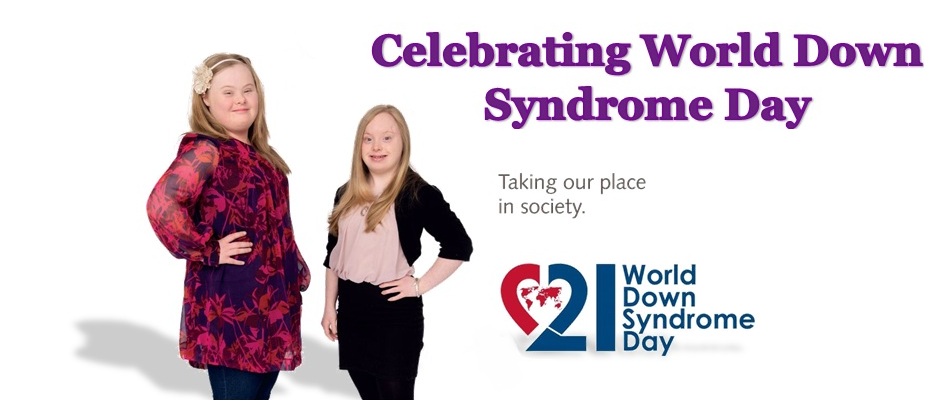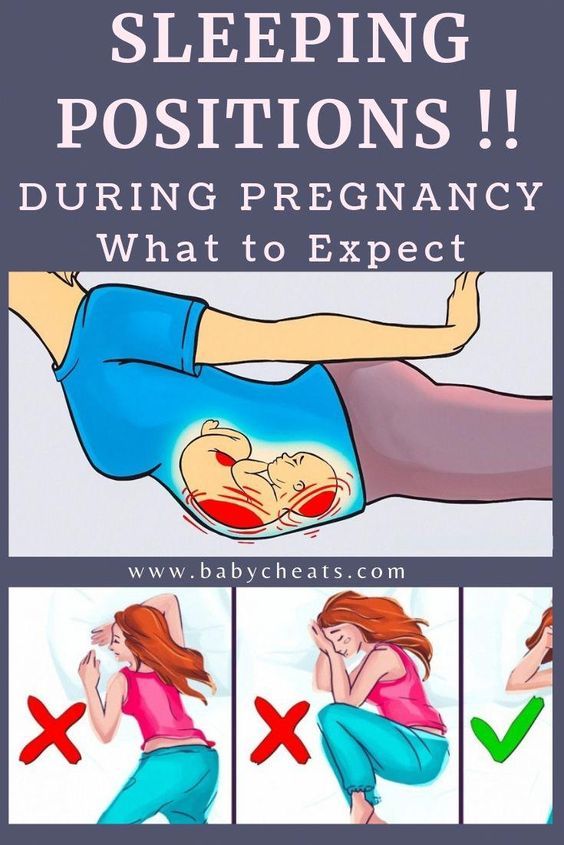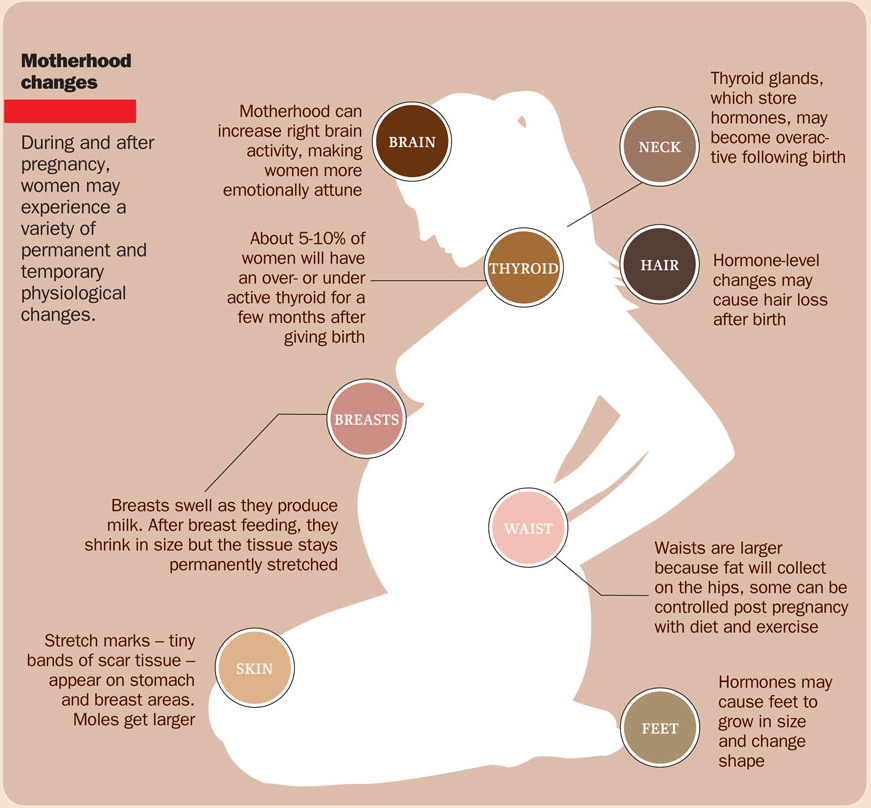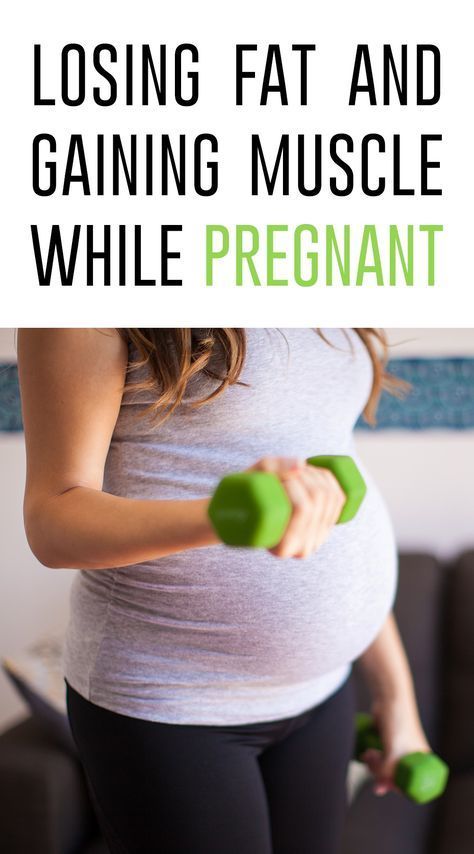Uncomfortable in pregnancy
Common discomforts of pregnancy
Acne
What can I do about acne during pregnancy?
Acne may not cause you physical discomfort, but it may be annoying. If you’ve never had it, you may get it for the first time during pregnancy. If you’ve had it before pregnancy, it may get worse during pregnancy. We don’t know exactly why acne happens during pregnancy, but it’s probably because of extra hormones in your body.
To treat acne during pregnancy:
- Wash your face at morning and night with a mild cleanser and lukewarm water.
- If your hair is oily, wash it with shampoo every day. Try to keep your hair off your face.
- Don’t pick or squeeze acne. This can cause scarring.
- Use makeup that is oil-free. Look for the words water-based, noncomedogenic or nonacnegenic on the product label.
- Talk to your health care provider about medicine you can take to treat acne. Don’t take any medicine—even acne medicine—without talking to your provider first.
Some acne medicine can be harmful to your baby. Some can cause birth defects.
Here’s what you need to know about acne medicine:
Most over-the-counter acne medicines are safe to use during pregnancy, but check with your provider first. During pregnancy, you may be able to use products that contain:
- Azelaic acid
- Glycolic acid
- Topical benzoyl peroxide
- Topical salicylic acid
Dapsone, a newer acne medicine, may be safe to use during pregnancy, but talk with your provider before you use it.
Some acne medicines are not safe to use during pregnancy. They can cause serious problems for your baby, including birth defects. Don’t use these medicines during pregnancy:
- Hormonal therapy
- Isotretinoin and other retinoids
- Oral and topical tetracyclines
Talk to your provider before you take any medicine during pregnancy. Make sure any provider you see (like a doctor who has special training to treat skin, hair and nails [dermatologist]) knows you’re pregnant.
Back pain and sciatica
What can I do about back pain and sciatica during pregnancy?
Pregnancy hormones, your growing belly and weight gain during pregnancy can cause lower-back pain, especially in the later months. Pressure from the uterus can affect your sciatic nerve, which goes from the lower back to the hip and down the back of the leg. Pain along the sciatic nerve is called sciatica.
Here’s what you can do to help relieve back pain during pregnancy:
- Stand up straight with your chest up and your shoulders back and relaxed. Don’t lock your knees. Avoid standing for long periods of time. If you have to stand for a long time, try to rest one foot at a time on a stool or box.
- Sit in chairs that have good back support. Put a small pillow behind your lower back for extra support.
- Wear shoes with low heels and good arch support. Don’t wear flats or high heels.
Don’t lift heavy things. To pick up something off the floor, bend at the knees and keep your back straight. Don’t bend over at the waist.
Don’t bend over at the waist. - Sleep on your left side and put a pillow between your legs or sleep with a full body pillow. Sleep on a firm mattress. If your mattress is soft, put a board between it and the box spring to make it feel firmer.
- Wear maternity pants that have a wide elastic band that goes under your belly. You may want to try wearing a belly-support girdle made just for use during pregnancy.
- Aim to be active every day. Talk to your health care provider about exercises and stretches you can do to help strengthen your back muscles.
- Try putting a heating pad or ice pack on your back.
- Talk to your provider before you take any pain medicine. This includes prescription and over-the-counter medicine, supplements and herbal products.
Call your provider right away if:
- Your back pain is severe or if you also have a fever.
- Your feet are numb or your legs are weak.
- You have severe pain in your calves.
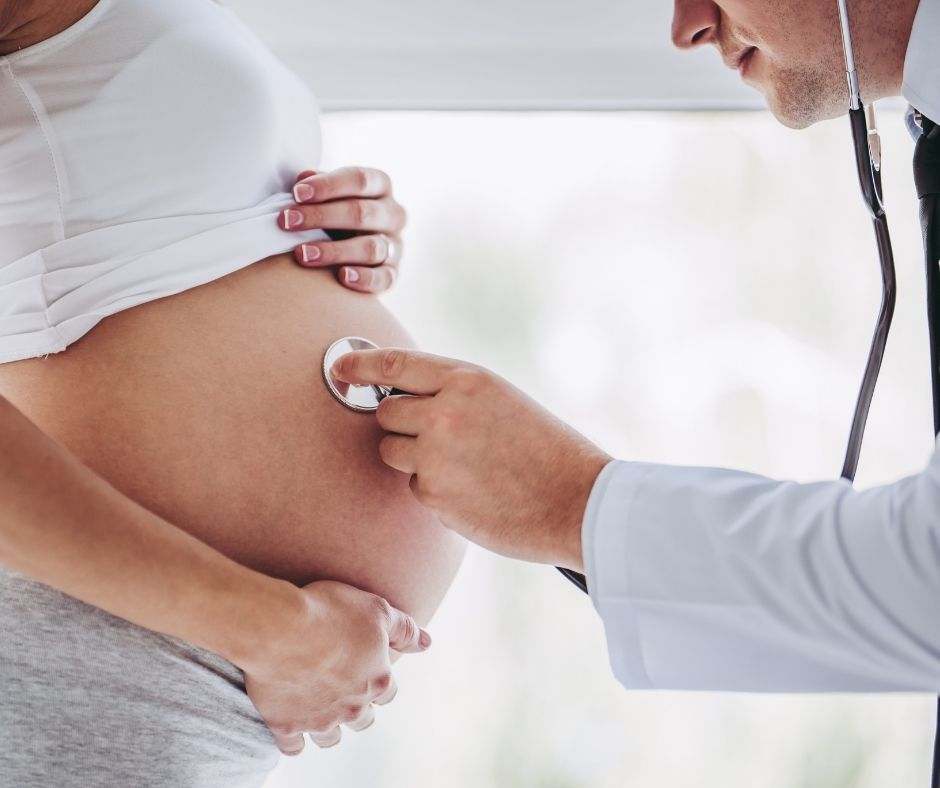
- It burns when you pee (urinate).
- You’re bleeding from your vagina.
Belly pain
What can I do about pain in my lower belly?
As your baby grows, the muscles around the uterus (womb) pull and stretch. This can cause pain low in your belly. You may feel it most when you cough or sneeze. It usually goes away if you stay still for a bit or if you change to a different position.
Call your health care provider if your belly pain is severe, gets worse or doesn’t go away.
Breasts
What can I do about sore breasts during pregnancy?
Your breasts begin to change early in pregnancy as they get read to make breast milk to feed your baby. Breast changes include:
- Getting bigger, fuller and heavier. They may even seem swollen. Tender, swollen breasts may be one of the first signs that you’re pregnant. Your breasts grow because of pregnancy hormones and the increase in fat and milk glands in them.
 As the skin on your breasts grows, it may be itchy and you may see stretch marks.
As the skin on your breasts grows, it may be itchy and you may see stretch marks. - Nipples and areolas getting darker. Your nipples may stick out more, and the areolas may get larger. The areola is the dark area around the nipple.
- Leaking colostrum. Colostrum is clear, sticky liquid that comes out of your breasts right after birth before your breast milk comes in. Your body starts making it during the last few months of pregnancy. As you get closer to your due date, colostrum may leak from your breasts.
Here’s what you can do to help relieve soreness in your breasts:
- Get a good maternity bra that has wide straps and bigger cups.
- If you exercise, make sure your bra gives you good support.
- If your breasts itch, use lotion. Talk to your health care provider about what kind to use.
- If you are leaking colostrum, you can get pads to put in your bra cups to absorb the liquid.
If the soreness in your breasts doesn’t go away, is severe or you feel a lump in your breast, call your provider. If you’ve had breast surgery or implants, tell your provider.
If you’ve had breast surgery or implants, tell your provider.
Congestion and nosebleeds
What can I do about congestion and nosebleeds during pregnancy?
You may have a runny or stuffy nose (nasal congestion) or nosebleeds during pregnancy. They’re caused by increased pregnancy hormones and blood in your body that make the lining of your nose swell, dry out and bleed.
Here’s what you can do if you have or want to prevent a stuffy or runny nose or nosebleed:
- Use a humidifier to increase the moisture in the air in your home.
- Drink plenty of water.
- Put a few dabs of petroleum jelly on the insides of your nose.
- Use saline nose drops or nose rinse. Don’t use any other kind of medicine without talking to your provider first.
If you have a nosebleed:
- Sit up straight and lean forward.
- Breathe through your mouth and pinch your nose shut for 5 to 10 minutes with your thumb and finger.
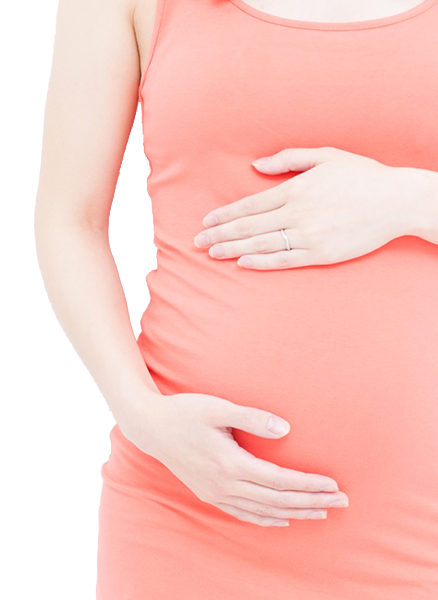
- If you get blood in your mouth, spit it out. Swallowing it may upset your stomach.
Call your health care provider right away if:
- You have signs of a cold or the flu, like sneezing, coughing, a sore throat, fever or minor aches.
- A nosebleed lasts longer than 20 minutes.
- You get a nosebleed after an injury to your head.
Constipation
What can I do about constipation during pregnancy?
Constipation is common later in pregnancy. It’s when you don’t have bowel movements or they don’t happen often, or your stools (poop) are hard to pass. Constipation during pregnancy may be caused by pregnancy hormones and the weight of your growing uterus, which can affect the process of how your body breaks down food after you eat (digestion).
Here’s what you can do to help relieve constipation during pregnancy:
- Drink lots of water. Fruit juice (especially prune juice) can help, too.
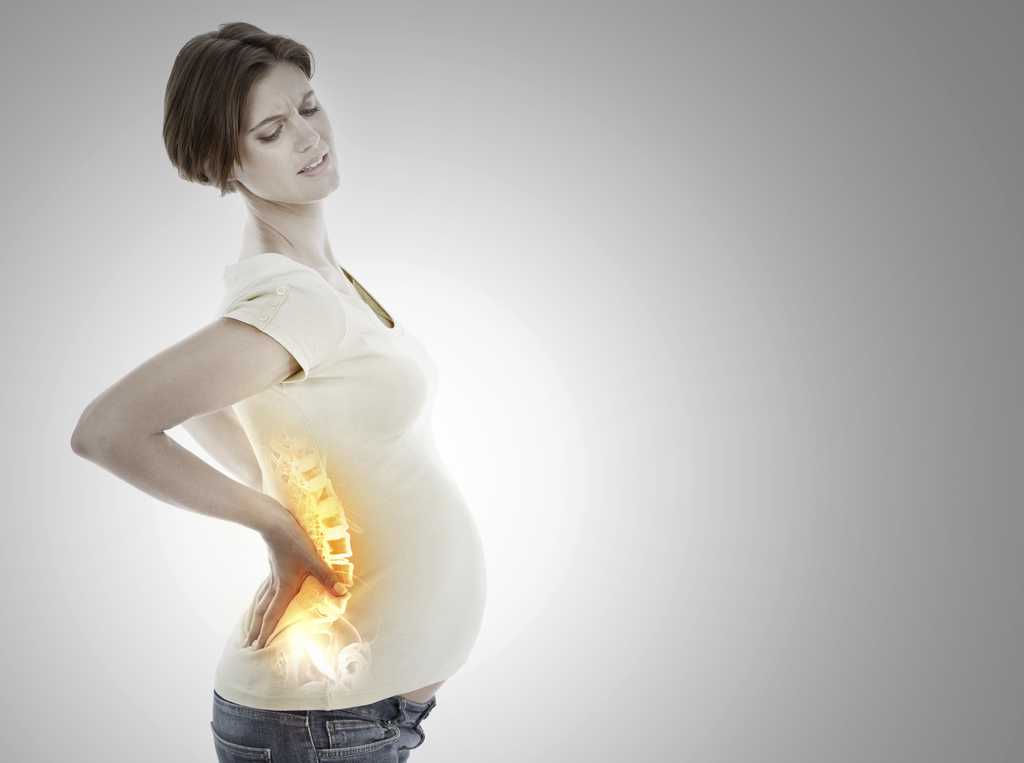
- Eat foods that are high in fiber, like fruits, vegetables, beans, whole-grain bread and pasta and bran cereal.
- Eat smaller meals several times a day. Smaller amounts of food may be easier to digest.
- Do something active every day. Walking is good. Ask your provider about other activities that are safe during pregnancy.
- Tell your provider about any supplements you take, especially an iron supplement. Too much iron can lead to constipation. Don’t take any medicine, supplement or herbal product during pregnancy without talking to your provider first. A supplement is a product you take to make up for certain nutrients that you don't get enough of in foods you eat.
- Ask your provider about over-the counter medicine that is safe to take. Don’t take any kind of medicine during pregnancy without talking to your provider first.
If you haven’t had a bowel movement in 3 days, call your provider right away.
Fatigue and sleep problems
What can I do about fatigue and sleep problems during pregnancy?
Fatigue means being really tired and having little energy. You may feel fatigue early and late in pregnancy. Your body may be tired because:
You may feel fatigue early and late in pregnancy. Your body may be tired because:
- It’s working hard to take care of your growing baby. Your body’s making pregnancy hormones and you’re using a lot of energy, even when you sleep.
- You may have trouble sleeping at night because you’re uncomfortable or you need to get up to go to the bathroom. Later in pregnancy, leg cramps may wake you up at night.
- You may feel more stress than before you got pregnant. Stress is worry that you feel in response to things that happen in your life. Stress can make you feel tired.
- You may have other children to take care of and other activities that take up a lot of your time.
Here’s what you can do to help you feel less tired:
- Try to go to bed and wake up at the same time every day. Take short naps during the day, if you can.
- Eat healthy foods. Drink plenty of water during the day but cut back a few hours before you go to bed at night.
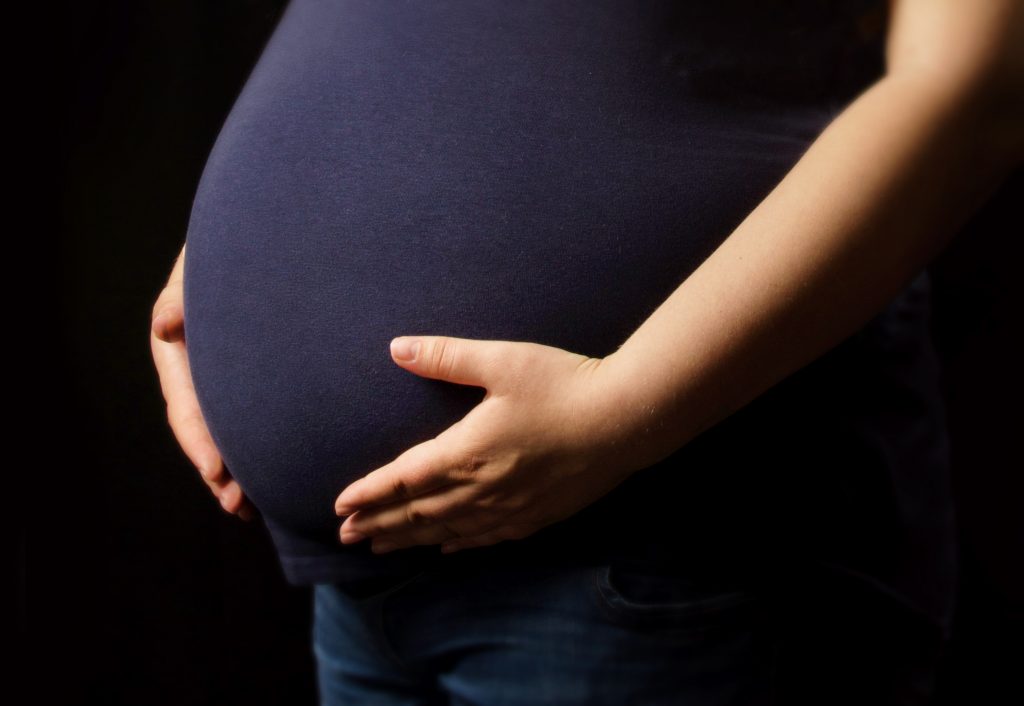
- Do something active every day. Talk to your health care provider about activities that are safe during pregnancy.
- Cut back on activities that aren’t necessary or that make you tired. Ask your partner, family and friends to help you out around the house or running errands. If you have sick days or vacation days at work, use them.
Here’s what you can do to help you get a good night’s sleep:
- Sleep on your left side with a pillow under your belly and another one under your legs.
- Take a warm shower or bath before you go to bed to help you relax.
- Do exercises, like yoga, to help you relax before going to bed.
- Make sure your bedroom is quiet and comfortable.
- Cut out caffeine, especially before bedtime. Caffeine is a drug found in things like coffee, tea, soda, chocolate and some energy drinks and medicines. It stimulates the brain, so it makes you feel awake. It stays in the body for several hours, so limit it in the afternoon or evening.

Call your provider right away if you’re severely tired or if it begins to interfere with your everyday life.
Gas
What can I do to help reduce gas during pregnancy?
During pregnancy, certain hormones and your growing baby crowding your belly can slow down the process of how your body breaks down food after you eat (digestion) and cause you to bloat, burp and pass gas.
Here’s what you can do to help reduce gas during pregnancy:
- Don’t eat foods that cause gas, like fried or fatty foods, beans, cabbage, cauliflower and dairy products, like milk and cheese. Limit food and drinks that are carbonated (bubbly), like soda.
- Eat several small meals during the day.
- Do something active every day. Exercise can help improve digestion. Talk to your provider about safe activities to do during pregnancy.
- Talk to your health care provider before you take any medicine to help relieve gas and bloating.
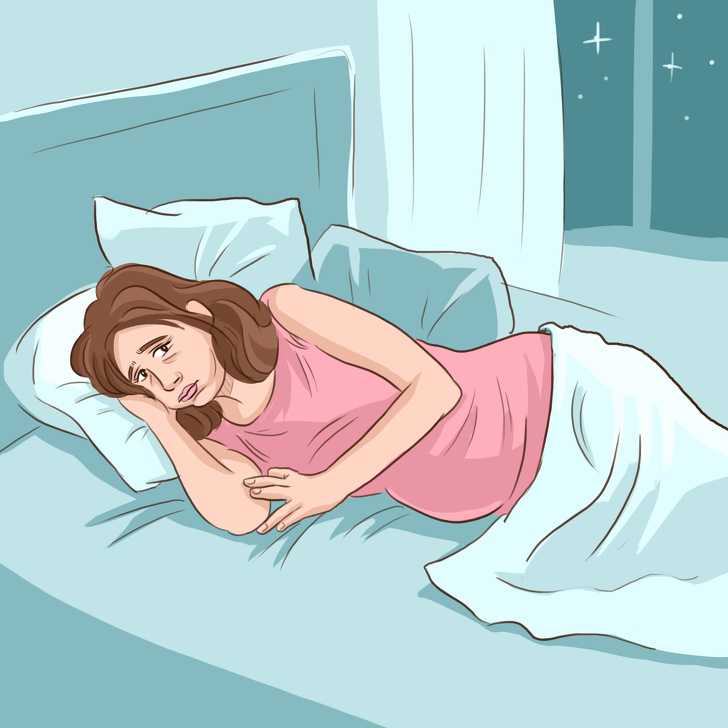
Call your provider right away if you have:
- Gas that feels like labor contractions, that comes and goes regularly, every 5-10 minutes. Contractions are when the muscles of your uterus get tight and then relax. Contractions help push your baby out of your uterus.
- Blood in your stool (poop)
- Severe diarrhea
- Nausea (feeling sick to your stomach) and vomiting
Headaches
What can I do to help relieve headaches during pregnancy?
Headaches are common during pregnancy, especially in the first trimester. They’re often caused by pregnancy hormones, stress or body tension caused by carrying extra weight throughout pregnancy. If you’re cutting back on caffeine during pregnancy, you may get a headache until your body is used to the new amount.
Here’s what you can do to help relieve headaches during pregnancy:
- Talk to your health care provider before you take any medicine, supplement or herbal product to relieve your headache.
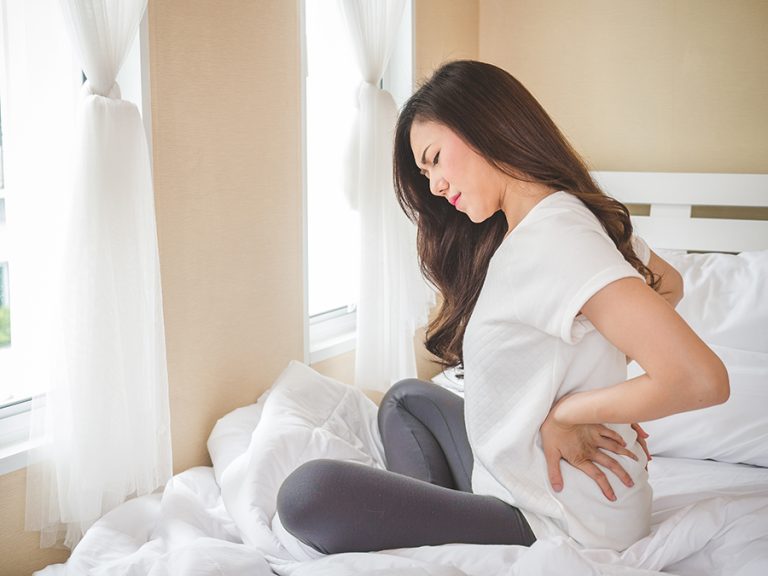 Some may be harmful to your baby. A supplement is a product you take to make up for certain nutrients that you don’t get enough of in the foods you eat. An herbal product, like a pill or tea, is made from herbs (plants) that are used in cooking.
Some may be harmful to your baby. A supplement is a product you take to make up for certain nutrients that you don’t get enough of in the foods you eat. An herbal product, like a pill or tea, is made from herbs (plants) that are used in cooking. - Try to figure out what causes your headache (called a headache trigger). Common headache triggers are cigarette smoke, certain foods and eye strain. Once you know your triggers, try to limit or get rid of them.
- Eat healthy foods, drink lots of water and do something active every day.
- Get a good night’s sleep every night. Rest during the day when you can.
- Try to reduce your stress. Stress is worry, strain or pressure that you feel in response to things that happen in your life. Tell your health care provider if you need help to reduce your stress.
- Try relaxation techniques, like deep breathing, yoga and massage. Take a warm shower or bath before you go to bed.
- Put a damp cloth on your head or on the back of your neck.
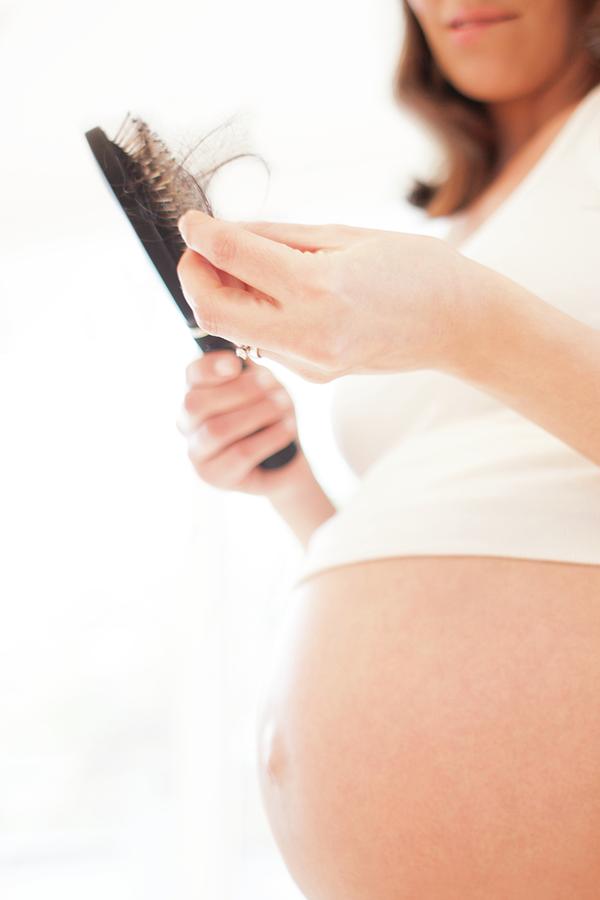
Call your provider right away if your headache:
- Is severe or doesn’t go away. Severe headaches during pregnancy may be a sign of preeclampsia. This condition can happen after the 20th week of pregnancy. It’s when a woman has high blood pressure and signs like a severe headache that mean that some of her organs aren’t working properly.
- Comes with fever, vision changes, slurred speech, sleepiness, numbness or not being able to stay alert.
- Comes after falling or hitting your head.
- Comes with a stuffy nose, pain and pressure under your eyes or a toothache. These may be signs of a sinus infection.
Heartburn
What can I do to help relieve heartburn during pregnancy?
Heartburn is a painful, burning feeling in the throat or chest. It happens when food or stomach acid backs up into the tube that carries food, liquid and saliva from your mouth to your stomach (esophagus). Heartburn is common during pregnancy because pregnancy hormones relax the valve between the stomach and the esophagus, and your growing uterus (womb) puts pressure on your stomach.
Here’s what you can do to help relieve heartburn during pregnancy:
- Eat five or six small meals a day instead of three large meals. Eat meals slowly—don’t rush.
- Drink more fluids between meals and less with meals.
- Don’t eat late at night. Eat your last meal two to three hours before you lie down or go to bed.
- Don’t eat foods that cause heartburn, like greasy or fatty foods, spicy foods, citrus products (like oranges or orange juice) and chocolate.
- Don’t drink alcohol. Drinking alcohol during pregnancy can cause serious problems for your baby.
- Raise your head up on pillows when you sleep.
- Talk to your health care provider before you take any medicine, like an antacid, to help relieve heartburn.
Call your provider right away if you:
- Have heartburn that returns as soon as your antacid wears off
- Have heartburn that wakes you up at night
- Have trouble swallowing
- Are spitting up blood
- Have black stools (poop)
- Are losing weight
Hemorrhoids
What can I do to relieve hemorrhoids during pregnancy?
Hemorrhoids are swollen veins in and around the area where poop leaves the body (rectum). They’re itchy and painful. During pregnancy, they’re caused by increased blood flow in the pelvic area and the pressure on veins there from your growing uterus. Constipation can make them worse. Constipation is when you don’t have bowel movements or they don’t happen often, or your stools (poop) are hard to pass.
They’re itchy and painful. During pregnancy, they’re caused by increased blood flow in the pelvic area and the pressure on veins there from your growing uterus. Constipation can make them worse. Constipation is when you don’t have bowel movements or they don’t happen often, or your stools (poop) are hard to pass.
Here’s what you can do to help prevent hemorrhoids during pregnancy:
- Eat foods that are high in fiber, like fruit, vegetables, beans, whole-grain bread and pasta and bran cereal.
- Drink plenty of water.
- Do something active every day. Talk to your health care provider about activities that are safe during pregnancy.
- Gain the right amount of weight during pregnancy. Talk to your provider about how much you should gain.
- Try not to push too hard when you poop.
Here’s what you can to do help relieve hemorrhoids during pregnancy:
- Don’t sit for long periods of time. Get up and move around to help move the weight of your uterus off of the pelvic veins.

- Soak in warm tub a few times each day. Make sure the water isn’t hot.
- Ask your provider about over-the-counter medicine (creams or wipes) that are safe to use during pregnancy. Also ask about fiber supplements and stool (poop) softeners. Don’t take any medicine, supplement or herbal product without talking to your provider first. Over-the-counter medicine is medicine you can buy without a prescription from your provider. A supplement is a product you take to make up for certain nutrients that you don’t get enough of in the foods you eat. An herbal product, like a pill or tea, is made from herbs (plants) that are used in cooking.
- Talk to your provider about using an ice patch or witch hazel pads to help relieve pain and swelling.
If you have bleeding or severe pain, call your provider right away.
Leg cramps
What can I do to relieve leg cramps during pregnancy?
Leg cramps in your lower legs (calves) and even in your feet are common in the second and third trimesters. They often happen at night and can wake you up. We’re not exactly sure what causes leg cramps in pregnancy.
They often happen at night and can wake you up. We’re not exactly sure what causes leg cramps in pregnancy.
Here’s what you can do to help prevent leg cramps:
- Stretch your legs before you go to bed.
- Do something active every day. Talk to your health care provider about activities that are safe to do during pregnancy.
- Eat foods that are high in magnesium. Magnesium is a mineral that you get from food. Too little magnesium in your body may cause leg cramps. Foods that have a lot of magnesium in them are whole-grain bread and pasta, beans, nuts, seeds and dried fruit. Ask your provider about taking a magnesium supplement. A supplement is product you take to make up for certain nutrients that you don't get enough of in foods you eat.
- Drink lots of water.
- Wear comfortable and supportive shoes.
- Talk to your doctor about taking a calcium supplement.
Here’s what you can do to help relieve leg cramps:
- Stretch your calf muscles.
 Flex your feet and down.
Flex your feet and down. - Massage the calves using long, downward strokes.
- Take a hot shower or a warm bath.
- Put ice on your legs.
Call your provider if your leg cramps:
- Happen a lot
- Cause severe pain
- Come with swelling, redness, skin changes or weak muscles
- Don’t get better when you try to relieve them
Shortness of breath
What can I do to help with shortness of breath during pregnancy?
Shortness of breath is when you feel like you can’t get enough air into your lungs when you breathe. You may feel like this later in pregnancy, when your baby’s big and pressing on the muscle that helps you breathe (diaphragm). Even if you feel shortness of breath, your baby’s getting oxygen in the womb.
To help make breathing easier:
- Don’t smoke. If you need help to quit smoking, tell your health care provider.
- Sit or stand up straight to give your lungs room to expand.
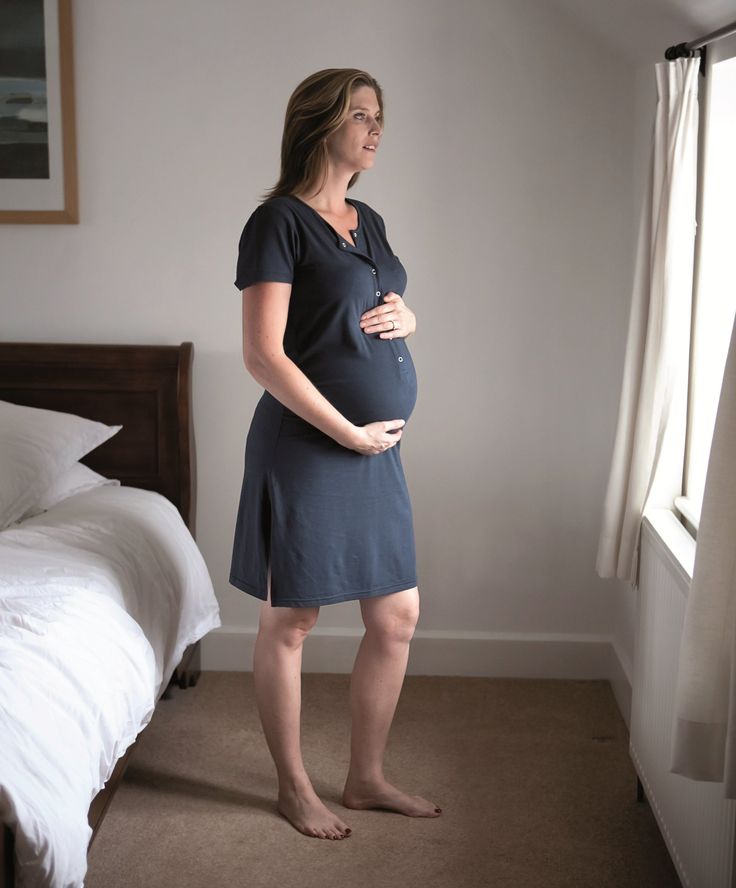 Move slowly.
Move slowly. - Try to breathe clean air. Stay away from secondhand smoke (smoke from someone else’s tobacco) and other air pollutants.
Call your provider if:
- There’s a big change in your breathing.
- You have a cough.
- You have pain in your chest.
Teeth and gums
How do teeth and gums change during pregnancy?
You may not expect it, but your teeth and gums may change during pregnancy. It’s important to keep your teeth and gums healthy so they don’t get infected. Infections during pregnancy can cause problems for you and your baby, like increasing your risk for preterm labor and premature birth. Preterm labor is labor that happens before 37 weeks of pregnancy. Premature birth is birth that happens before 37 weeks of pregnancy.
Common teeth and gum changes include:
- Your gums may be sensitive and swollen. They may bleed when you brush or floss.
- Your teeth may feel loose.
 This can happen because pregnancy hormones that help relax muscles for labor and birth may relax the tissue that holds your teeth in place.
This can happen because pregnancy hormones that help relax muscles for labor and birth may relax the tissue that holds your teeth in place. - If you have morning sickness, the acid in your mouth may cause the enamel on your teeth to wear off (erode). The acid also can cause cavities.
Here’s what you can do to help relieve any pain that may come with teeth and gum changes:
- Use a softer toothbrush.
- Rinse your mouth with warm salt water.
- Get regular dental checkups even during pregnancy. Make sure your dentist knows that you’re pregnant.
Urinating often
What can I do about having to urinate often during pregnancy?
You may need to pee (urinate) more often during pregnancy, especially early in pregnancy and in the final weeks before your baby is due. As your baby grows, the weight pushes down on your bladder. Urine may leak when you cough, laugh, sneeze or exercise.
Here’s what you can do if you need to urinate often:
- Don’t drink coffee, tea, soda and other drinks that have caffeine in them.
 Caffeine is a drug that can cause you to need to urinate more often.
Caffeine is a drug that can cause you to need to urinate more often. - Do Kegel exercises to help strengthen the muscles that control the flow of urine. To do them, squeeze the muscles you use to stop yourself from urinating. Hold the muscles tight for 3 seconds and then release. Do this 10 to 15 times, three times per day. Kegel exercises also help prepare muscles for labor and birth.
- Go when you need to go. Don’t try to hold it. When you urinate, lean forward a bit to completely empty your bladder.
- Go to the bathroom before you exercise. Talk to your health care provider about safe exercises to do during pregnancy.
- Stop drinking fluids about 2 to 3 hours before you go to bed.
- Use a pad or panty liner to catch leaks.
Call your provider right away if you have signs or symptoms of a urinary tract infection (also called a UTI). If it’s not treated, a UTI can lead to a more serious infection or preterm labor. Preterm labor is labor that happens too soon, before 37 weeks of pregnancy.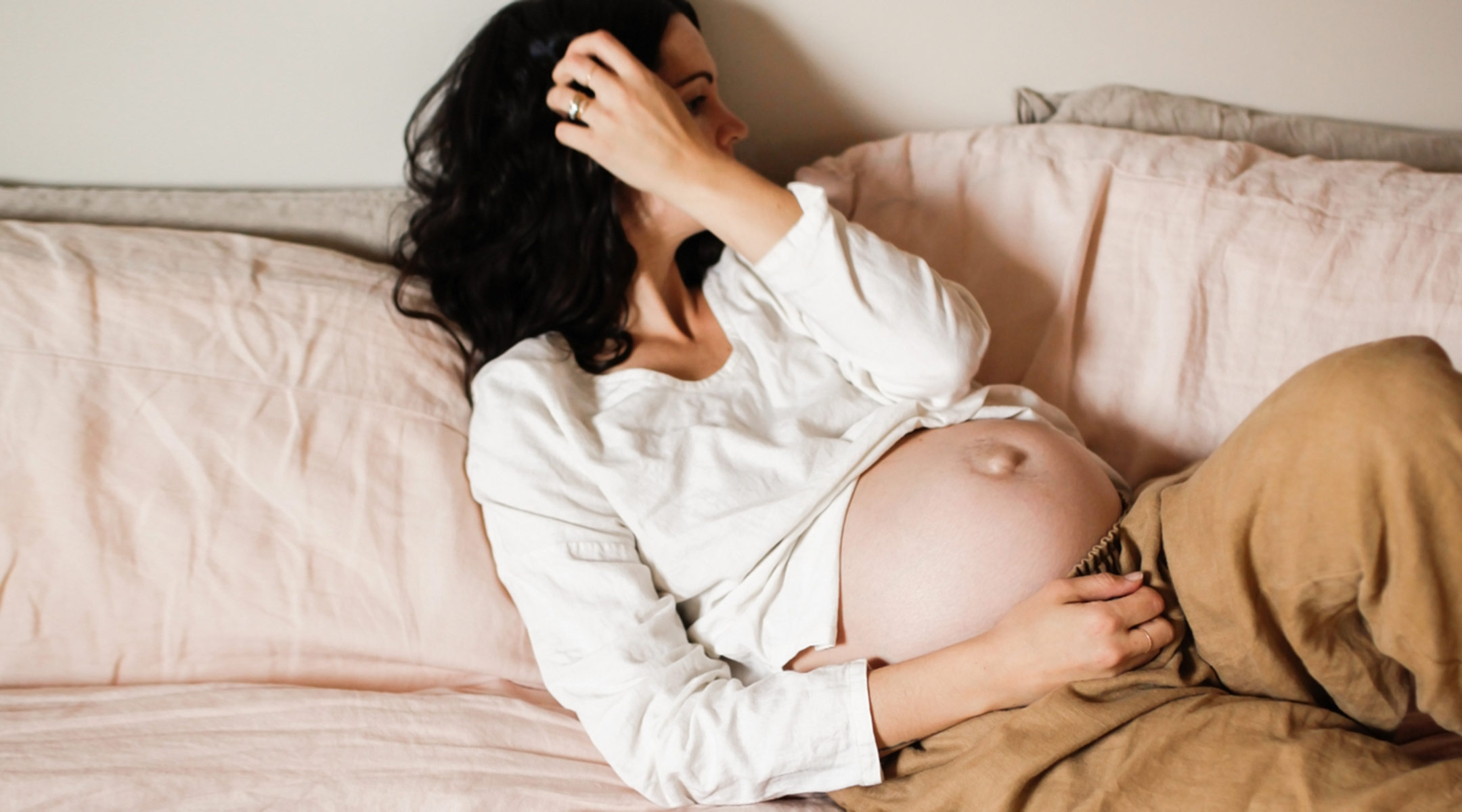 Signs and symptoms of UTIs include:
Signs and symptoms of UTIs include:
- Blood in the urine
- Fever
- Needing to go again immediately after you urinate
- Pain or burning when you urinate
Vaginal discharge
What do I need to know about vaginal discharge during pregnancy?
Vaginal discharge (also called lochia) that’s clear, white or sticky is normal during pregnancy. It’s caused by pregnancy-related changes in the birth canal (vagina) and the opening to the uterus at the top of the vagina (cervix).
Discharge that’s not normal may be a sign of infection, and infections can cause serious problems during pregnancy. Call your health care provider right away if your discharge:
- Is not clear or white
- Smells bad
- Comes with itchiness
- Comes with pain or soreness
Varicose veins and swelling in your legs, ankles and feet
What can I do about varicose veins and swelling in my legs, ankles and feet?
If you look down and can’t see your ankles, you’re not alone! Many women have swelling in their legs, ankles and feet during pregnancy. Swelling may be caused by pregnancy hormones, having more fluid in your body during pregnancy, and pressure from your growing baby on the veins that carry blood to your heart.
Swelling may be caused by pregnancy hormones, having more fluid in your body during pregnancy, and pressure from your growing baby on the veins that carry blood to your heart.
Pressure on a vein called the inferior vena cava may cause sore, itchy, blue bulges on your legs. These are called varicose veins. They usually don’t cause problems, but they’re not pretty. You’re more likely to have them if it’s your first pregnancy or if other people in your family have them.
Here's what you can do to help relieve varicose veins and swelling in your legs, ankles and feet:
- Don’t stand for long periods of time.
- When you’re sitting down, put your feet up. Don’t cross your legs when you sit.
- When you’re lying down, put your legs up on a pillow.
- Sleep on your left side. This takes pressure off the vein that returns blood from the lower parts of your body to your heart.
- Wear support hose or compression stockings or leggings.
These fit tightly all over and can help control swelling. Don’t wear socks or stockings that have a tight band of elastic around the leg.
- Do something active every day. Talk to your provider about activities that are safe during pregnancy.
- Put an ice pack on swollen areas.
If you have extreme or sudden swelling, call your provider right away. These may be signs of a serious condition called preeclampsia. This condition can happen after the twentieth week of pregnancy. It’s when a woman has high blood pressure and signs like a severe headache that mean that some of her organs aren’t working properly.
Last reviewed: March 2022
21 Uncomfortable Symptoms of Pregnancy & Their Causes
Most pregnancies are medically uneventful and end happily in the birth of a healthy baby. Your first -- and most important -- step is to sign up for a comprehensive prenatal program with an obstetrician (a doctor who specializes in pregnancy and childbirth) or a midwife.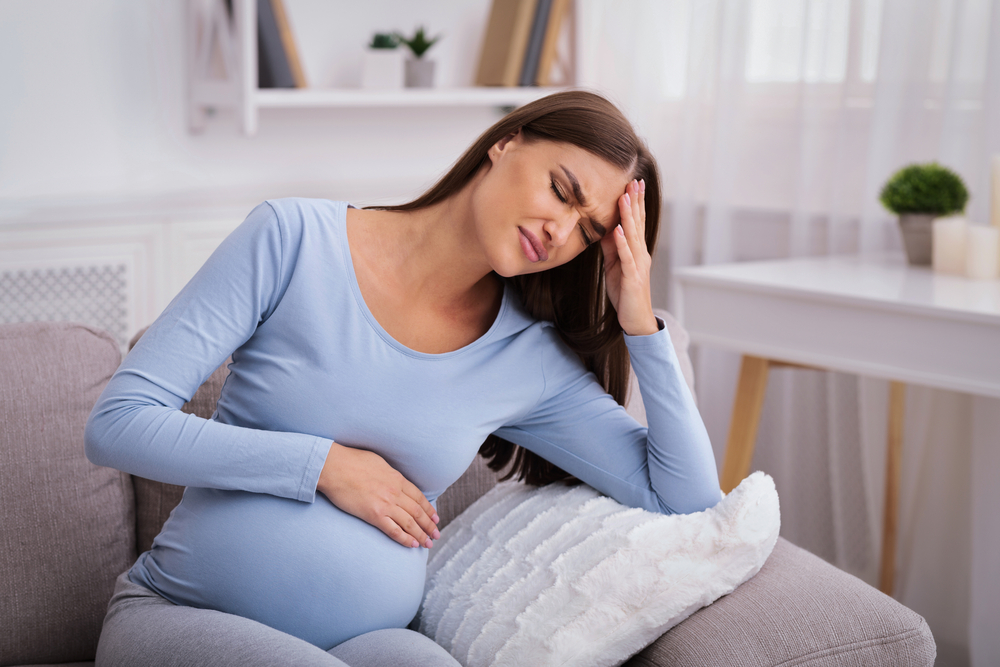 You and your developing baby will get routine monitoring to make sure everything is going well, and if it isn't, you will be referred for appropriate care. You and your partner will get confidence-building information about each stage of your pregnancy, including labor, childbirth, and the care and feeding of a newborn.
You and your developing baby will get routine monitoring to make sure everything is going well, and if it isn't, you will be referred for appropriate care. You and your partner will get confidence-building information about each stage of your pregnancy, including labor, childbirth, and the care and feeding of a newborn.
Yet you still have 40 weeks to wonder whether certain physical discomforts are serious enough for medical intervention or are minor problems you can deal with on your own.
You'll have various kinds of discomforts during pregnancy -- some fleeting, some more permanent. Some may happen in the early weeks, while others emerge closer to the time of delivery. Still others may start early and then go away, only to return later.
Every person's pregnancy is unique, so you may not have all of the changes described below.
When to Call Your Doctor
Talk to your doctor if:
- You have severe nausea and vomiting, dehydration, a persistent rapid heartbeat, or pale, dry skin; you may have hyperemesis gravidarum, a severe form of morning sickness.
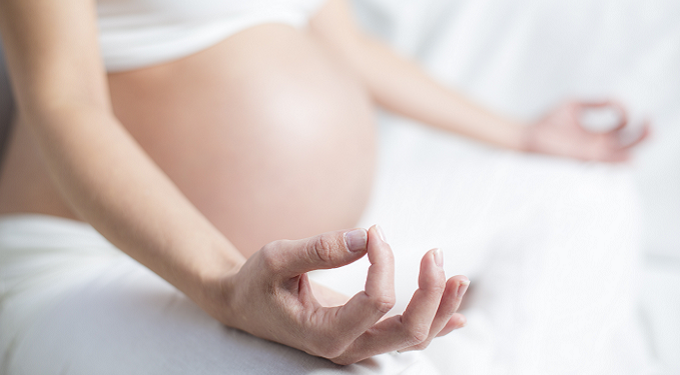
- You have vaginal spotting or bleeding; you may be having a miscarriage or serious placental complication.
- You have sudden weight gain over a few days, severe headache, or blurred vision; you may have preeclampsia, a form of high blood pressure that can endanger your health and the health of your baby.
- You have a fever over 100 F and chills, backache, or blood in your urine; you may have a kidney infection or other infection.
- After the baby begins to move, you feel less or no movement for more than 2 hours; your baby may be in fetal distress.
- You feel wetness or a leaking of fluid, unlike normal vaginal secretions or urinary leakage; you may have ruptured membranes or leaking of amniotic fluid.
Pregnancy Breast Changes
Most pregnant women will feel some changes in their breasts. Your breasts will get bigger as your milk glands enlarge and the fat tissue enlarges, causing breast firmness and tenderness, typically during pregnancy's first and last few months. Bluish veins may also appear as your blood supply increases. Your breasts might leak a yellowish fluid called colostrum, usually during the third trimester. Colostrum is the “pre-milk” that will nourish your baby in the first days of life until your milk comes in. As you get closer to delivery, it changes to a thin, colorless liquid.
Bluish veins may also appear as your blood supply increases. Your breasts might leak a yellowish fluid called colostrum, usually during the third trimester. Colostrum is the “pre-milk” that will nourish your baby in the first days of life until your milk comes in. As you get closer to delivery, it changes to a thin, colorless liquid.
Your nipples can also darken. They may stick out more, and the areolas may get bigger. Small glands around the nipples become raised. They make oil to keep your nipples soft. These changes make it easier for your baby to find and latch onto your nipples for breastfeeding.
The freckles and moles on your body may be darker, too. Talk to your doctor if you have a mole or freckle that is growing, changing color and shape, itching or bleeding, or larger than a pencil eraser. These may be signs of skin cancer.
Recommendations:
- Wear a bra that provides firm support.
- Choose cotton bras or those made from natural fibers.

- Get a bigger bra as your breasts become larger and fuller. Your bra should fit well without irritating your nipples. Try maternity or nursing bras, which provide more support and can be used after pregnancy if you choose to breastfeed.
- Try wearing a bra during the night.
- Tuck a cotton handkerchief or gauze pad into each bra cup to absorb leaking fluid. You can also buy nursing pads in the drugstore or maternity/baby store that fit into your bra. Make sure to change these pads as needed so your skin doesn't get irritated.
- Wash your breasts with warm water and mild soap that will not cause dryness.
Pregnancy Fatigue
Feeling tired? That might be because your growing baby requires extra energy. Sometimes, it's a sign of anemia (low iron in the blood), which is common during pregnancy.
Recommendations:
- Get plenty of rest; go to bed earlier and take naps.
- Keep a regular schedule when possible.
- Pace yourself.
 Balance activity with rest.
Balance activity with rest. - Moderate exercise daily boosts your energy level.
- Ask your health care provider to test your blood routinely for anemia.
Pregnancy Nausea or Vomiting
It's very common -- and normal -- to have an upset stomach when you're pregnant.
Chalk it up to pregnancy's hormonal changes. It usually happens early in pregnancy, while your body is adjusting to the higher hormone levels.
Good news: Nausea usually disappears by the fourth month of pregnancy (although in some cases it can persist throughout the pregnancy). It can happen at any time of the day but may be worse in the morning, when your stomach is empty (that's why it's called "morning sickness") or if you aren't eating enough.
Recommendations:
- If nausea is a problem in the morning, eat dry foods like cereal, toast or crackers before getting out of bed. Try eating a high-protein snack such as lean meat or cheese before going to bed (protein takes longer to digest).

- If you are hungry but extremely nauseated, try the BRAT (bananas, rice and tea) diet as well as bland foods.
- Acupressure wristbands offer some pregnant women comfort.
- Ginger may combat nausea.
- Eat small meals or snacks every two to three hours rather than three large meals. Eat slowly and chew your food completely.
- Sip on fluids throughout the day. Avoid large amounts of fluids at one time. Try cool, clear fruit juices, such as apple or grape juice.
- Avoid spicy, fried, or greasy foods.
- If you are bothered by strong smells, eat foods cold or at room temperature to minimize or avoid odors that bother you.
- Talk to your doctor about taking vitamin B6. Other natural treatments and prescription medications can provide relief.
- Contact your health care provider if your vomiting is constant or so severe that you can't keep fluids or foods down. This can cause dehydration and should be treated right away.
Pregnancy Diarrhea
Diarrhea usually doesn't mean anything is wrong.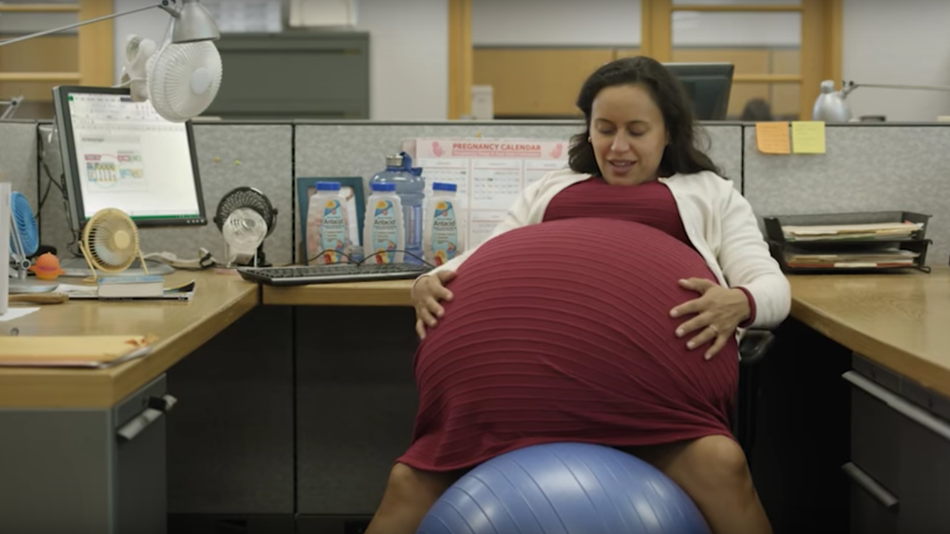 But it can be distressing. It may be related to your prenatal vitamin or your attempts to eat better, or it could just be a bug you caught. In any case, when diarrhea strikes during pregnancy, it's even more important to take good care of yourself.
But it can be distressing. It may be related to your prenatal vitamin or your attempts to eat better, or it could just be a bug you caught. In any case, when diarrhea strikes during pregnancy, it's even more important to take good care of yourself.
Call your doctor if the diarrhea is serious or lasts more than 24 hours, if you get dehydrated or dizzy, if the stool has blood or pus, if it's black and tarry, if you also have a fever or severe belly pain, or if you think medication might help ease your symptoms.
Recommendations:
- Eat bland, soft, and low-fiber foods such as bananas, rice, toast, mashed potatoes, yogurt, or cottage cheese.
- Drink plenty of water and electrolyte drinks such as Gatorade or Pedialyte to replace lost fluids. (If you have gestational diabetes, check with your doctor first.) It's especially dangerous to become dehydrated during pregnancy. Dehydration can trigger preterm contractions.
Pregnancy Bloating
Your pants may feel tight even if you're not that far along. Blame hormone changes. Early in pregnancy, rising progesterone can cause your digestive system to slow and your smooth muscle tissue to relax. This can cause bloating. It's similar to what happens to many women right before their period starts.
Blame hormone changes. Early in pregnancy, rising progesterone can cause your digestive system to slow and your smooth muscle tissue to relax. This can cause bloating. It's similar to what happens to many women right before their period starts.
Recommendations:
- Do gentle exercise, such as walking or swimming, which helps keep the digestive system moving.
- Drink water throughout the day to help digestion.
- Eat smaller meals more often. It's easier on the digestive system.
- Eat foods high in fiber, such as fruits, vegetables, and whole grains.
Pregnancy Frequent Urination
It's normal to have to pee a lot when you're pregnant. Early in your pregnancy, your body makes a hormone that may increase urination. Your growing uterus and baby also press against your bladder. The pressure can wake you up several times a night to go to the bathroom. You may also have the urge to go even when your bladder is almost empty. This problem usually goes away a few days after your baby is born.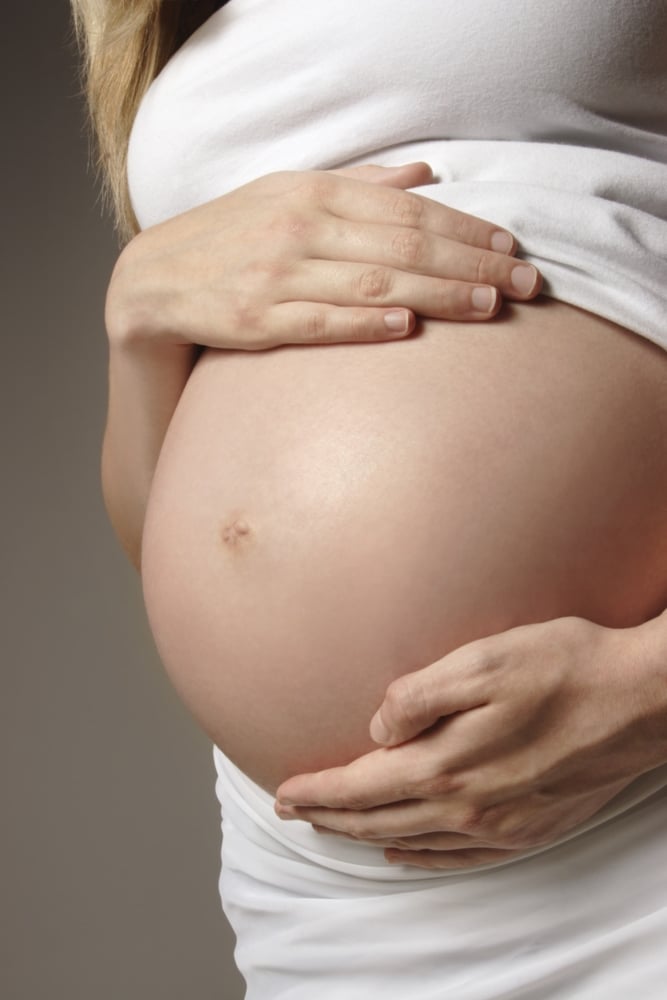
Call your doctor if you have a fever or blood in your urine, or if you have the urge to go again just after you've emptied your bladder. If it hurts, burns, or stings when you pee, you could have a urinary tract infection. This needs treatment right away.
Recommendations:
- Don't wear tight-fitting underwear, pants, or pantyhose.
- Drink plenty of fluids to avoid dehydration. Try to get them mostly during the day. Drink less in the evening and at night. This should help you cut back on nighttime bathroom visits.
- Avoid coffee, tea, colas, and other caffeinated drinks. These can make you urinate more often.
Pregnancy Headaches
Headaches can happen anytime during pregnancy. They can be caused by tension, congestion, constipation, or in some cases, preeclampsia (detected after 20 weeks).
Recommendations:
- Put an ice pack on your forehead or the back of your neck.
- Rest, sit, or lie quietly in a low-lit room.
 Close your eyes and try to relax your back, neck, and shoulders.
Close your eyes and try to relax your back, neck, and shoulders. - Over-the-counter acetaminophen like Tylenol may help. But if your headaches don't go away, are severe, make you nauseous, or affect your vision, tell your doctor.
Pregnancy Bleeding and Swollen Gums
You may not have expected pregnancy to affect your mouth. But your blood circulation and hormone levels can make your gums tender and swollen, and you may notice they bleed more easily. You may also develop nose bleeds.
Recommendations:
- Get a dental checkup early in your pregnancy to make sure your teeth and mouth are healthy. See your dentist if you notice a particular problem.
- Brush your teeth, floss regularly and rinse daily with an antiseptic mouthwash.
Pregnancy Constipation
Your hormones, as well as vitamins and iron supplements, may cause constipation (trouble pooping or incomplete or infrequent passage of hard stools). Pressure on your rectum from your uterus may also cause constipation.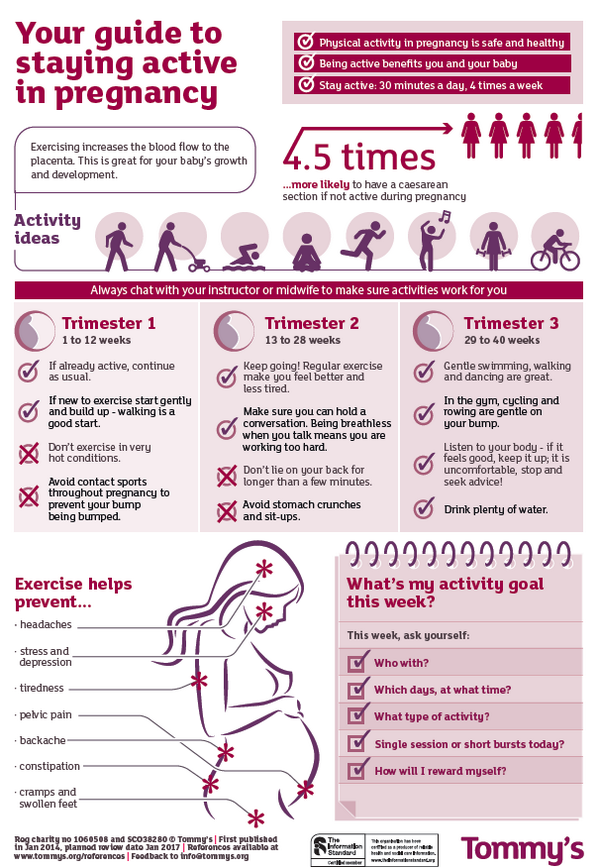
Call your doctor if you also have abdominal pain or rectal bleeding. If iron supplements are causing constipation, they may recommend a different one.
Recommendations:
- Add more fiber (such as whole grain foods, fresh fruits, and vegetables) to your diet.
- Drink plenty of fluids daily (at least 6-8 glasses of water and 1-2 glasses of fruit or prune juice).
- Drink warm liquids, especially in the morning.
- Exercise daily. Walking and swimming are activities that are gentle on your pregnant body.
- Avoid straining when you have a bowel movement.
- Talk with your doctor about a laxative or stool softener.
Pregnancy Wrist Pain (Carpal Tunnel)
You might be surprised that carrying a baby could cause pain in your wrist. But up to 35% of women get pain or weakness in their wrist during pregnancy, usually in the third trimester. Fluid retention puts more pressure on the carpal tunnel, which runs from your wrist to the bottom of your palm. Most likely, the pain will get better within a few months of your baby's birth.
Most likely, the pain will get better within a few months of your baby's birth.
Call your doctor if you have numbness, tingling, or pain in your hand or wrist or if you have pain or strange sensations traveling up your arm to your shoulder.
Recommendations:
- Do range-of-motion exercises that stretch your wrist.
- Apply ice for pain.
- Avoid repetitive wrist and hand motions, or positions or activities that make pain or numbness worse. Wear a wrist splint if your job requires repetitive motions.
- If computer work is causing pain, adjust your chair or keyboard height to change the position of your wrists.
- Wear a wrist splint to bed if you have pain at night. It keeps your wrists from curling while you sleep, which contributes to pain.
Pregnancy Dizziness (Feeling Faint)
Dizziness can occur anytime during middle to late pregnancy. Here's why it happens:
- The hormone progesterone dilates blood vessels so blood tends to pool in the legs.

- More blood is also going to your growing uterus. This can cause a drop in blood pressure, especially when changing positions -- and that can make you dizzy. If your blood sugar levels get too low, you may feel faint.
Recommendations:
- Move around often when standing for long periods of time.
- Lie on your left side to rest. This helps circulation throughout your body.
- Avoid sudden movements. Move slowly when standing from a sitting position.
- Eat regular, small meals throughout the day to prevent low blood sugar.
- Drink plenty of water.
Trouble Sleeping During Pregnancy
Finding a comfortable resting position can become difficult later in pregnancy. And your ballooning belly and bathroom breaks aren't the only things keeping you up. From backaches to heartburn to anxiety, a wide range of concerns can affect slumber. Hormones can also disrupt your sleep patterns, leaving you exhausted by day and wide awake by night.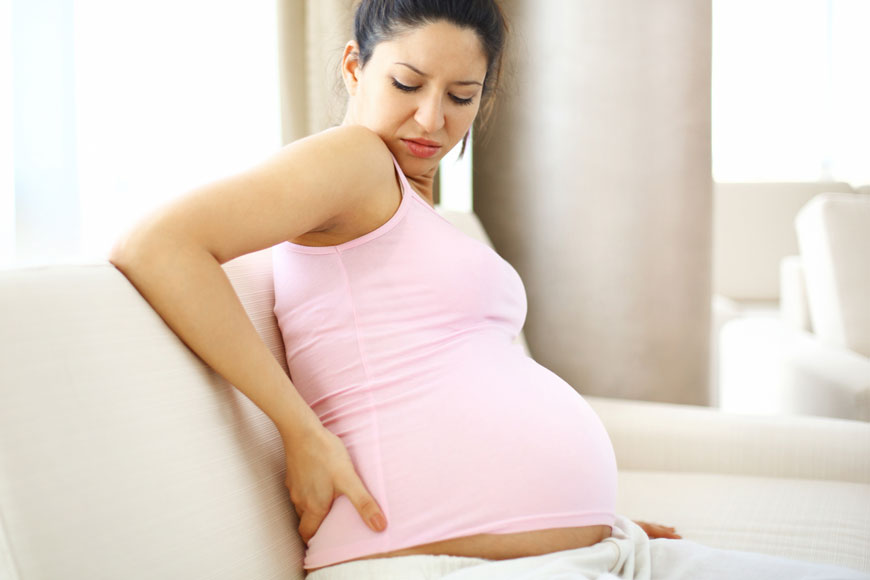
Even though you may not be sleeping well, now is when you need sleep the most. Your body needs to rest so it can feed and house your growing baby.
Recommendations:
- Don't take sleep medication.
- Try drinking warm milk at bedtime.
- Take a warm shower or bath before bedtime.
- Use extra pillows for support while sleeping. Lying on your side, place a pillow under your abdomen, behind your back, and between your knees to prevent muscle strain and help you get the rest you need.
- Use blocks to prop up the head of the bed a few inches. This can ease breathing and help prevent any backflow of stomach acid from reflux.
- You will probably feel better lying on your left side; this improves circulation of blood throughout your body. Sleep with bent knees to take pressure off your back.
- Exercise. Every day, try to take a 30-minute walk or a pregnancy exercise class. Staying active can help you sleep better. Just do it early in the day.
 Exercising within 4 hours of bedtime can be stimulating enough to keep you up.
Exercising within 4 hours of bedtime can be stimulating enough to keep you up. - Relax before bed. Try a pregnancy yoga video or some deep-breathing exercises.
- Stretch. Do a few leg stretches to keep your legs from cramping during the night.
- Limit drinks. Stop drinking within 2 or 3 hours of bedtime so you won't have to get up and go to the bathroom in the middle of the night.
- Avoid late meals as well as spicy, greasy, or acidic foods close to bedtime.
- Pee before sleeping. Make one last trip to the bathroom before you turn out the light.
- Turn down the thermostat. You're going to feel warmer now because extra blood is rushing to your skin. Keeping your bedroom cool will make you more comfortable and prevent you from having to kick off the covers in the middle of the night.
Pregnancy Heartburn or Indigestion
Heartburn is a burning feeling that starts in the stomach and seems to rise up to the throat. During pregnancy, changing hormone levels slow down your digestive system, weaken the stomach sphincter, and your uterus can crowd your stomach, pushing stomach acids upward.
Recommendations:
- Eat several small meals each day instead of three large meals.
- Eat slowly.
- Drink warm liquids.
- Avoid fried, spicy, or rich foods, or any foods that seem to give you indigestion.
- Don't lie down right after eating.
- Keep the head of your bed higher than the foot of your bed. Or place pillows under your shoulders to prevent stomach acids from rising into your throat.
- Don't mix fatty foods with sweets in one meal, and try to separate liquids and solids at meals.
- Try heartburn relievers such as Gaviscon, Maalox, Mylanta, Riopan, Titralac, or Tums.
Pregnancy Hemorrhoids
Hemorrhoids are swollen veins that appear as painful lumps on the anus. During pregnancy, they may form as a result of increased circulation and pressure on the rectum and vagina from your growing baby.
Recommendations:
- Try to avoid constipation. Constipation can cause hemorrhoids and will make them more painful.
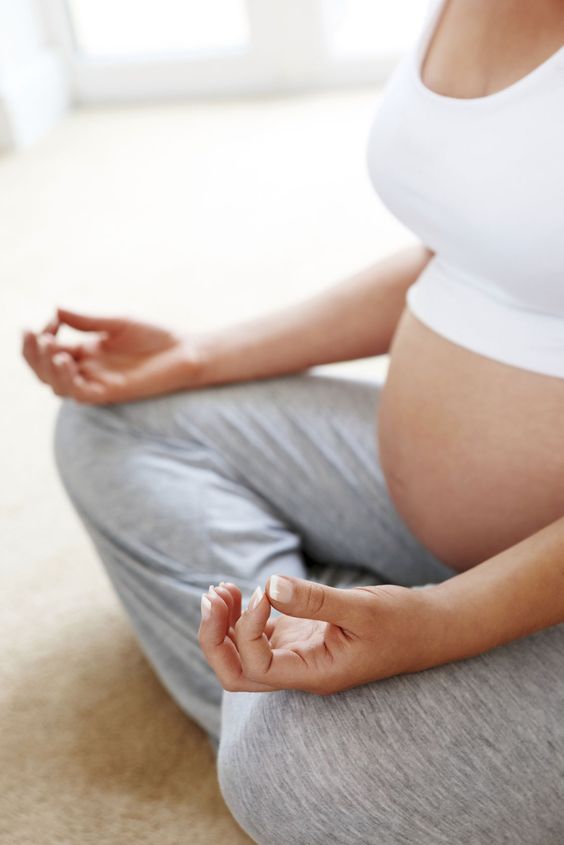
- Avoid sitting or standing for long periods of time; change your position frequently.
- Don't strain during a bowel movement.
- Apply ice packs or cold compresses to the area or take a warm bath a few times a day to provide relief.
- Avoid tight-fitting underwear, pants, or pantyhose.
- If you still need more help, consult your health care provider.
Pregnancy Varicose Veins
Pregnancy hormones may cause the walls of your veins to weaken and swell. Pressure on the veins behind your uterus also slows the circulation of blood to your heart, making the smaller veins in your pelvis and legs swell. You're most likely to get these bluish, swollen veins in your legs. But in late pregnancy, they may appear in your vulva, the area outside your vagina. Varicose veins will probably get better after your baby is born, when pressure on your veins goes away.
Call your doctor if the veins feel hard, warm, or painful, or if the skin over them looks red.
Recommendations:
Although varicose veins usually run in families, these things might help:
- Avoid standing or sitting in one place for long periods. It's important to get up and move around often.
- Avoid remaining in any position that might restrict the circulation in your legs (such as crossing your legs while sitting).
- Elevate your legs and feet while sitting.
- Exercise regularly.
- Wear support hose. Avoid socks or knee-highs that are too tight or constraining.
- Sleep or rest on your left side to ease pressure on the vein that carries blood from your feet to your heart. It's on your right side.
Pregnancy Leg Cramps
Pressure from your growing uterus can cause leg cramps or sharp pains down your legs.
Recommendations:
- Be sure to eat and drink foods that are rich in calcium (such as milk, broccoli or cheese).
- Wear comfortable, low-heeled shoes.
- Try wearing support hose, but avoid any leg wear that is too tight.

- Elevate your legs when possible; avoid crossing your legs.
- Exercise daily.
- Stretch your legs before going to bed.
- Avoid lying on your back, since the weight of your body and the pressure of your enlarged uterus can slow the circulation in your legs, causing cramps.
- Gently stretch any muscle that becomes cramped by straightening your leg, flexing your foot, and pulling your toes toward you.
- Massage the cramp or apply heat or a hot water bottle to the sore area.
Pregnancy Nasal Congestion
You may have a stuffy nose or feel like you have a cold. Pregnancy hormones sometimes dry out the nose's lining, making it inflamed and swollen.
Recommendations:
- Apply a warm, wet washcloth to your cheeks, eyes, and nose to reduce congestion.
- Avoid using nasal sprays unless prescribed by your doctor because they can aggravate your symptoms.
- Drink plenty of fluids (at least 6-8 glasses of fluids a day) to thin mucus.
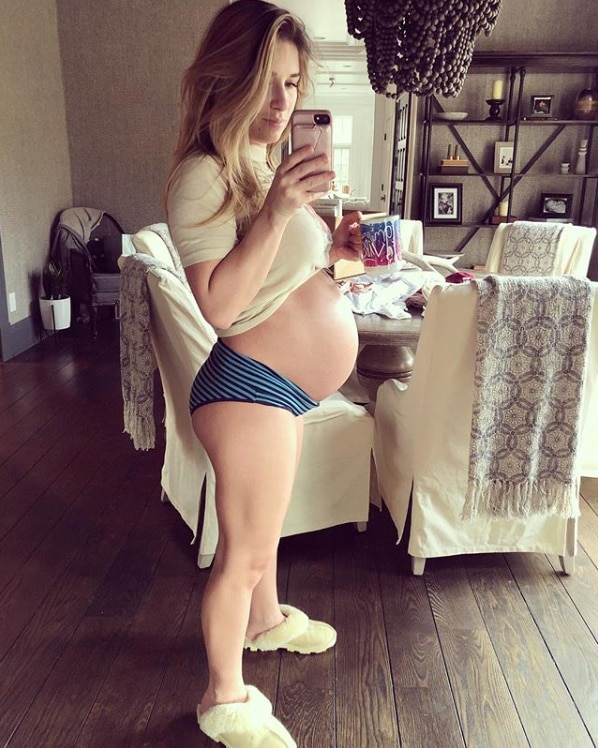
- Elevate your head with an extra pillow while sleeping to prevent mucus from blocking your throat.
- Use a humidifier or vaporizer to add moisture to the air.
- Take a warm shower or bath.
Shortness of Breath During Pregnancy
Shortness of breath can happen due to increased upward pressure from the uterus and changes in physiologic lung function.
Recommendations:
- When walking, slow down and rest a few moments.
- Raise your arms over your head (this lifts your rib cage and allows you to breathe in more air).
- Avoid lying flat on your back, and try sleeping with your head elevated.
- If prolonged shortness of breathing continues or you experience sharp pain when inhaling, contact your health care provider. You could have a pulmonary embolism (blood clot in the lungs).
Pregnancy Stretch Marks
Stretch marks are a type of scar tissue that forms when the skin's normal elasticity is not enough for the stretching that occurs during pregnancy. They usually appear on the abdomen and can also appear on the breasts, buttocks or thighs.
They usually appear on the abdomen and can also appear on the breasts, buttocks or thighs.
Though they won't disappear completely, stretch marks will fade after delivery. Stretch marks affect the surface under the skin and are not preventable.
Recommendations:
- Be sure that your diet contains enough sources of the nutrients needed for healthy skin (especially vitamins C and E).
- Apply lotion to your skin to keep it soft and reduce dryness.
- Exercise daily.
Swelling in the Feet and Legs During Pregnancy
Pressure from your growing uterus on the blood vessels carrying blood from the lower body causes fluid buildup. The result is swelling (edema) in the legs and feet.
Additional weight during pregnancy can also make your feet bigger. Plus, pregnancy hormones loosen your ligaments and muscles so your pelvic joints open up to get ready for childbirth. This affects your whole body, even your feet. Call your doctor if any swelling is more than mild or if it suddenly gets worse.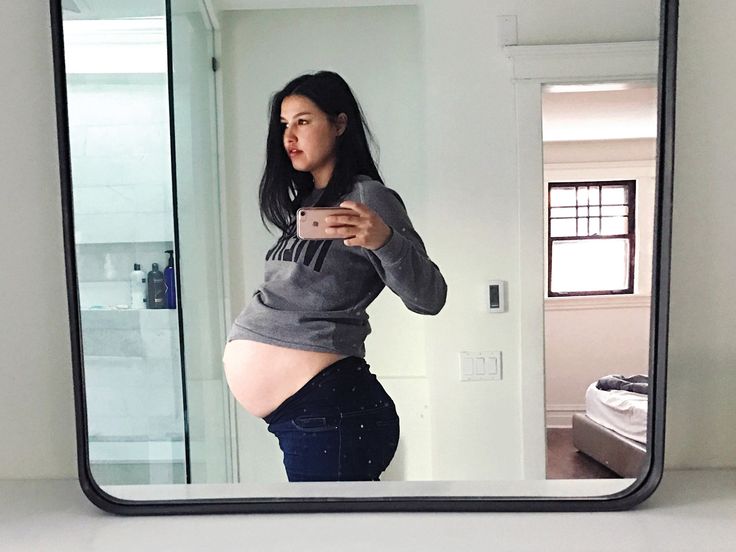
Recommendations:
- Try not to stay on your feet for long periods of time. Avoid standing in one place.
- Drink plenty of fluids (at least 6-8 glasses of fluids a day).
- Avoid foods high in salt (sodium).
- Elevate your legs and feet while sitting. Avoid crossing your legs.
- Wear loose, comfortable clothing; tight clothing can slow circulation and increase fluid retention.
- Soak your feet in cool water.
- Keep moving. Exercise your legs to keep fluid from building up.
- Don't wear tight shoes; choose supportive shoes with low, wide heels.
- Keep your diet rich in protein; too little protein can cause fluid retention.
- Notify your health care provider if your hands or face swell. This may be a warning sign of preeclampsia.
- Rest on your side during the day to help increase blood flow to your kidneys.
Vaginal Discharge During Pregnancy
Normal vaginal secretions increase during pregnancy due to greater blood supply and hormones. Normal vaginal discharge is white or clear, isn't irritating, is odorless, and may look yellow when dry on your underwear or panty liners.
Normal vaginal discharge is white or clear, isn't irritating, is odorless, and may look yellow when dry on your underwear or panty liners.
Recommendations:
- Choose cotton underwear or brands made from natural fibers.
- Avoid tight-fitting jeans or pants.
- Do not douche. Douching can introduce air into your circulatory system or break your bag of waters in later pregnancy.
- Clean the vaginal area often with soap and water.
- Wipe yourself from front to back.
- Contact your health care provider if you have burning, itching, irritation or swelling, bad odor, bloody discharge, or bright yellow or green discharge (these symptoms could be a sign of infection).
Pregnancy Backaches
Backaches are usually caused by the strain put on the back muscles, changing hormone levels, and changes in your posture.
Recommendations:
- Wear low-heeled (but not flat) shoes.
- Avoid lifting heavy objects.

- Squat down with your knees bent when picking things up instead of bending down at the waist.
- Don't stand on your feet for long periods. If you need to stand for long periods, place one foot on a stool or box for support.
- Sit in a chair with good back support, or place a small pillow behind your lower back. Also, place your feet on a footrest or stool.
- Check that your bed is firm. If needed, put a board between the mattress and box spring.
- Sleep on your left side with a pillow between your legs for support.
- Apply a hot water bottle or heating pad on low setting to your back, take a warm bath or shower, or try massage.
- Perform exercises, as advised by your health care provider, to make your back muscles stronger and help relieve the soreness.
- Maintain good posture. Standing up straight will ease the strain on your back.
- Contact your health care provider if you have a low backache that goes around your stomach and does not go away within one hour after you change position or rest.
 This might be a sign of premature labor.
This might be a sign of premature labor.
Abdominal Pain or Discomfort
Sharp, shooting pains on either side of your stomach may result from the stretching tissue supporting your growing uterus. These pains may also travel down your thigh and into your leg.
Recommendations:
- Change your position or activity until you are comfortable; avoid sharp turns or movements.
- If you have a sudden pain in your abdomen, bend forward to the point of pain to relieve tension and relax the tissue.
- Apply a hot water bottle or heating pad to your back, or take a warm bath or shower.
- Try a massage.
- Make sure you are getting enough fluids.
- Take Tylenol (acetaminophen) occasionally.
- Contact your health care provider if the pain is severe or constant or if you are less than 36 weeks pregnant and you have signs of labor. (Signs of labor include repetitive cramping like contractions.)
Braxton-Hicks Contractions
The uterine muscles will contract (tighten) starting as early as the second trimester of pregnancy.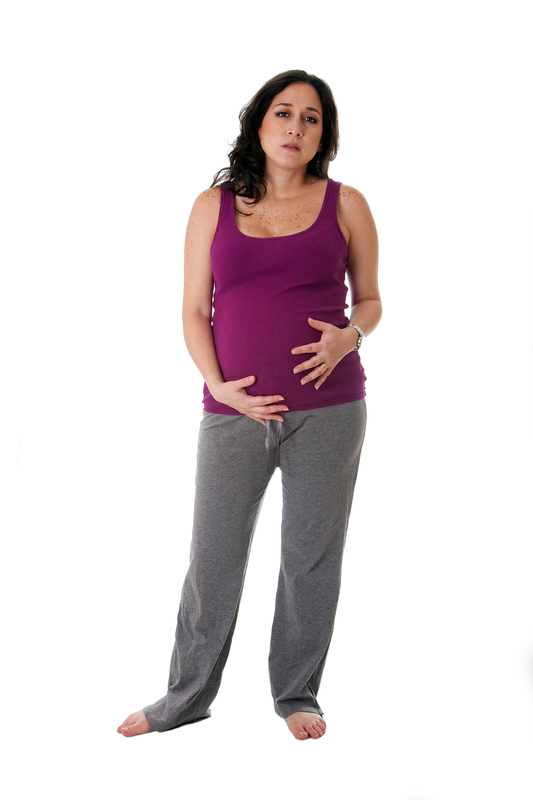 Irregular, infrequent contractions are called Braxton-Hickscontractions (also known as "false labor pains"). These are normal during pregnancy.
Irregular, infrequent contractions are called Braxton-Hickscontractions (also known as "false labor pains"). These are normal during pregnancy.
Recommendations:
- Try to relax
- Change positions. Sometimes this can ease the contractions.
- Call your doctor if they do not go away.
How to sleep during pregnancy
It is difficult to overestimate the role of sleep in the life of every person. A complete healthy rest allows you to fully restore the functioning of the nervous system, relieve stress, improve performance and increase activity. Chronic sleep deprivation is the cause of many diseases. What can we say about a woman who is at the stage of bearing a baby. During this period, more than ever, she needs a healthy, long and full sleep. However, unfortunately, it is during this period that one can only dream of a restful sleep.
As soon as a woman finds out about her new position, she has to give up a lot for the sake of the health of her unborn baby. And you need to give up not only bad habits: alcohol, cigarettes, coffee, but also from a comfortable sleep.
And you need to give up not only bad habits: alcohol, cigarettes, coffee, but also from a comfortable sleep.
The cause of insomnia can be :
- Anxiety;
- Frequent urination;
- Fears and phobias before a new stage of one's life;
- Nervousness and irritability;
- Digestive disorder;
- Toxicosis;
- Physical indisposition;
- Uncomfortable posture.
During the period of bearing a child, the female body experiences an extraordinary load, especially in the last trimester. The need for more sleep increases, because the body expends much more energy. Therefore, healthy sleep and pregnancy are inextricably linked.
As soon as a woman finds out about her new position, she has to give up a lot for the sake of the health of her unborn baby. And you need to give up not only bad habits: alcohol, cigarettes, coffee, but also from a comfortable sleep.
Let's try to figure out how to sleep during pregnancy, so as not only not to harm the health of your unborn baby, but to sleep well.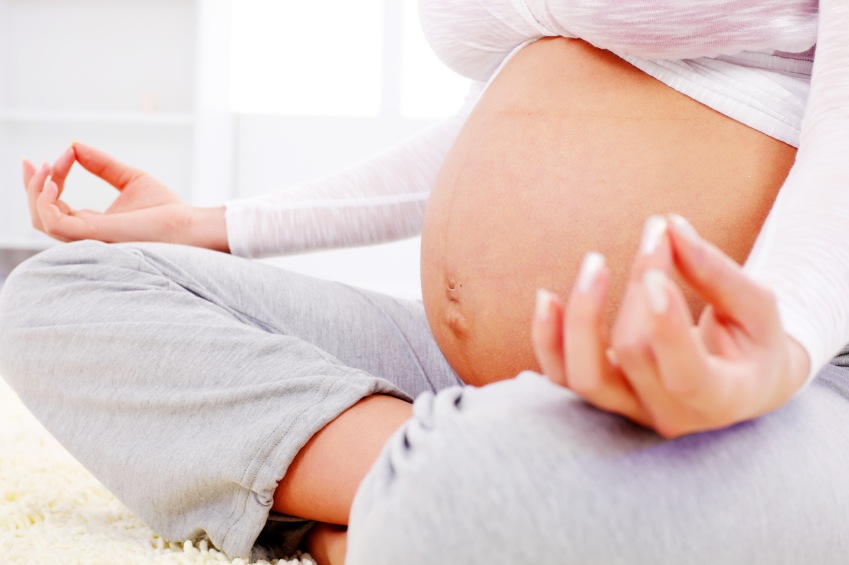
Looking for a comfortable sleeping position
Each person has his own favorite position, in which it is easy to fall asleep and sleep. Many do not imagine a comfortable rest on their backs, accustomed to sleeping on their stomachs. This habit will have to be sacrificed, as it is unsafe for the normal development of the fetus. If in the first three months of pregnancy a woman can still sleep in the position in which she is used to and feels comfortable, then after the first trimester the growing belly will not allow her to lie safely in this position. Despite the natural protection of the baby in the form of amniotic fluid, there is a high probability of injuring the baby in a dream, squeezing it. But what is the right way to sleep during pregnancy?
Back position
Even if you are used to sleeping in a Spartan position, on your back, with your arms spread wide, from the 28th week you will have to radically change your lifestyle. The fact is that as the fetus grows, the load on the intestines and vena cava will increase significantly, blocking the access of oxygen to the baby.
As soon as a woman finds out about her new position, she has to give up a lot for the sake of the health of her unborn baby. And you need to give up not only bad habits: alcohol, cigarettes, coffee, but also from a comfortable sleep.
If you sleep on your back during pregnancy, you may experience the following problems:
- Dizziness;
- Nausea;
- Convulsions;
- Numb limbs;
- Pressure reduction;
- Hemorrhoids;
- Heaviness of breathing.
If you feel these symptoms or the baby gives persistent signals, you need to urgently change your position, so squeezing the vena cava is fraught not only with poor health for the mother, but also with a lack of oxygen supply to the fetus.
Stomach position
One of the most beloved positions for many people, which allows you to quickly fall asleep while hugging a pillow. Many women, as soon as they find out about the change in their lives, are interested in the question, is it possible to sleep on your stomach during pregnancy? Doctors recommend abandoning this position already in the first weeks, even before the enlarged belly makes it impossible to fall asleep peacefully.
If you are afraid during sleep, without controlling your movements, to arbitrarily roll over on your stomach, you can put a large pillow that does not allow you to change position.
Side position
In order to normalize your sleep and not harm the health of the baby, experts recommend sleeping on your side during pregnancy. And if at first this option seems unacceptable to many, after the second trimester, lying on your side is the only possible one. But here the question arises, on which side to sleep in order to ensure the safety of the fetus?
Sleeping on the right side can cause squeezing of the kidney, which can have dire consequences. The ideal posture is lying on the left side. Thus, you not only do not injure the unborn baby, but also improve blood flow along with oxygen to the placenta.
But one should not ignore the individual characteristics of each organism and the position of the fetus in the uterus. When the baby is in a transverse position, choose the side where the baby's head is. And with a breech presentation, doctors recommend changing the position several times a night.
And with a breech presentation, doctors recommend changing the position several times a night.
If you still cannot improve your sleep, you feel unwell and you are tormented by insomnia, then it is better to consult a specialist. A good gynecologist will analyze the situation and help solve the problem. If necessary, he will prescribe a safe sedative that stabilizes the emotional state and helps to fall asleep calmly, resting and restoring the nervous system in a dream.
Help pillow
Fortunately, now modern manufacturers help women survive the pregnancy period with great comfort by offering special pillows. They are made taking into account the physiological characteristics of a woman in this period and allow you to find a comfortable position for relaxation.
You can buy two pillows and put one under your stomach and the other under your knees, looking for your best option. And you can buy a long banana-shaped pillow, which allows you to throw your leg on it while sleeping, which improves well-being and relieves the main load from the lower back and abdomen. Already in the last weeks of pregnancy, when the growing belly does not allow you to breathe normally, the pillow will allow you to take a comfortable half-sitting position.
Already in the last weeks of pregnancy, when the growing belly does not allow you to breathe normally, the pillow will allow you to take a comfortable half-sitting position.
Remember that pregnancy is your opportunity to gain strength and fully relax before the most crucial period in your life. Childbirth and the first weeks of caring for your baby will require a lot of energy from you, so good luck and sound sleep!
Why pregnant women don't get enough sleep | Shchotizhnevik PHARMACY
Pregnancy is a difficult period for the female body. Physical discomfort and emotional stress can lead to sleep disturbances such as waking up in the middle of the night. Fatigue is a common complaint among women in the first and third trimesters of pregnancy, said Kathy Lee, professor of nursing at the University of California, USA. At this time, you should be especially attentive to your need for healthy sleep.
Everyone knows the expression that a pregnant woman should "eat for two", in scientific circles there is an opinion that she should also "sleep for two". Pregnancy can affect not only the duration of sleep, but also its quality. Since falling asleep can be difficult during this period, experts recommend that pregnant women spend at least 8 hours in bed to get at least 7 hours of sleep.
Pregnancy can affect not only the duration of sleep, but also its quality. Since falling asleep can be difficult during this period, experts recommend that pregnant women spend at least 8 hours in bed to get at least 7 hours of sleep.
Scientists have found that sleep deprivation during pregnancy can lead to fatigue, irritability and impaired concentration. A scientific study found that women who experienced sleep deprivation during their first pregnancy were 4.5 times more likely to have a caesarean section than pregnant women who slept at least 7 hours a day. The average duration of labor among pregnant women with sleep deprivation was 10 hours or more, and for women with sufficient sleep duration - 7 hours.
Pregnant women should go to bed earlier as their bodies need extra rest, the scientists noted. Carrying a child requires an extreme expenditure of energy. The growth of the fetus and placenta is provided by the resources of the female body, which can lead to fatigue.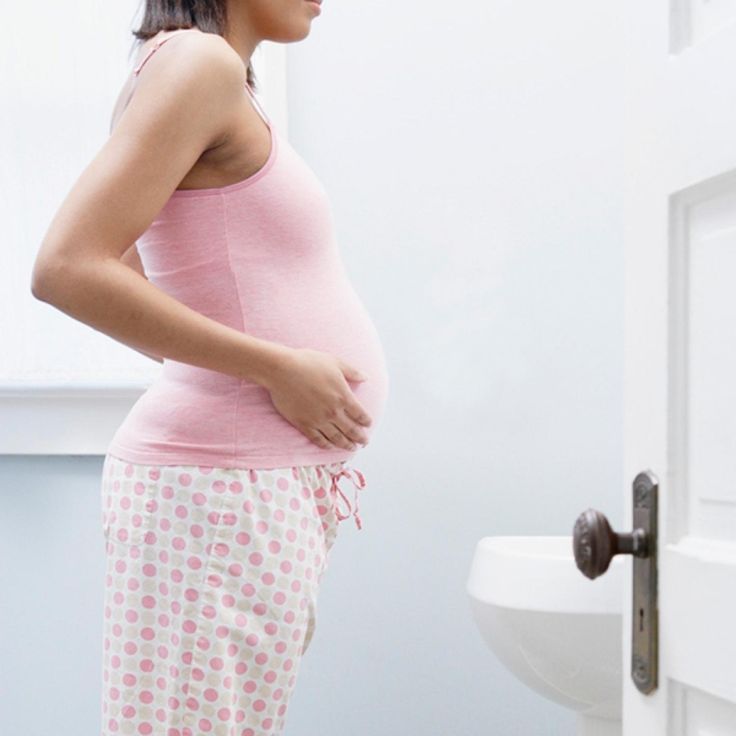 In addition, one of the causes of fatigue is emotional worries about future motherhood and childbirth.
In addition, one of the causes of fatigue is emotional worries about future motherhood and childbirth.
Sleep disturbances can occur at different stages of pregnancy. Some of them can be prevented by following simple recommendations from scientists.
I trimester of pregnancy. In the first months after conception, progesterone levels rise sharply, which not only leads to a feeling of drowsiness, but can also cause frequent urination, disrupting nighttime sleep and making it difficult to fall asleep. To cope with this problem, scientists recommend reducing the amount of liquid consumed in the evenings. It is best to replenish the water balance in the body in the first half of the day so that the urge to go to the toilet does not interfere with sleep at night.
Another factor in sleep disturbance during pregnancy is nausea, which can occur at any time of the day. To prevent its occurrence in the morning, immediately after waking up, you should eat a few crackers or crackers, scientists say.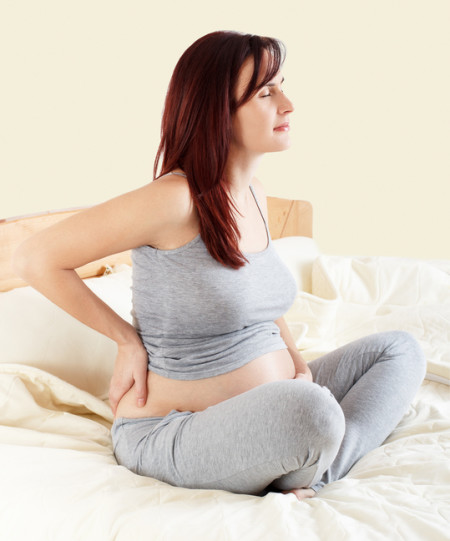
For healthy sleep, it is important to choose the right posture. A pregnant woman may experience discomfort and soreness in the area of the mammary glands, so you should abandon the idea of sleeping on your stomach.
The acceleration of metabolic processes can lead to an increase in body temperature during sleep in pregnant women. In this case, adjust the temperature in the bedroom accordingly. If a pregnant woman did not manage to sleep during the night, she should definitely take a nap in the daytime, the scientists noted.
II trimester of pregnancy. At this time, a pregnant woman may feel better than in previous months, as the pace of change slows down somewhat. But during this period, leg cramps may occur at night, especially in people with anemia. Often the only way to relieve discomfort in the legs is walking, but this interferes with sleep.
The fetus grows and over time can press on the stomach, sometimes leading to heartburn. In this case, scientists recommend that pregnant women sleep on their left side with bent knees, and also position their heads as high as possible.

